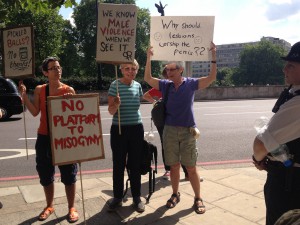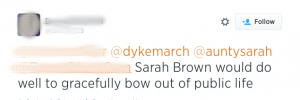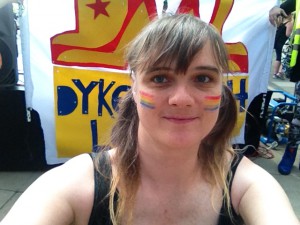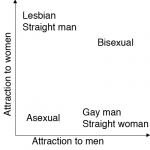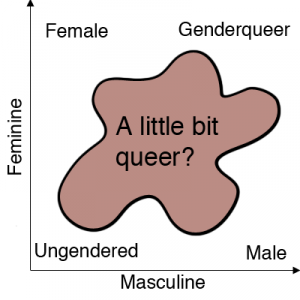Anti-transgender protestors held a picket at London Dykemarch on Saturday 21st of June, chanting transphobic slogans in an attempt to drown out my keynote speech.
As I gave my speech, a group of 6 protestors started trying to shout me down, and distributed leaflets amongst the gathered crowd calling me a “lesbian hating man”, claiming that I was part of a “male” takeover of lesbian spaces, and accusing me of appropriating a lesbian identity.Two of the protestors have since been identified as Dr Julia Long of Anglia Ruskin University in Cambridge, and Dr Lynne Harne, of Bristol University. Both lecture in women’s studies and both are involved in developing equalities policy.
Both academics have previously been involved in the London “RadFem” conferences, which are notorious for their trans exclusionary policies and their lineup of transphobic speakers. The conference lost its venues in 2012 and 2013 due to its transphobic-hate focus, having to find alternate venues at the last minute.
This is the latest incident in a campaign of transphobic harassment of me, coordinated via social media, which has been going on for several months, ever since I declined to engage in a panel discussion with journalist Julie Bindel, also noted for transphobic writing in the past.
Since then, a series of coordinated complaints about me were sent to the Liberal Democrat Party and Cambridge City Council, each of which was investigated and found to be invalid. I have had my blog targeted for a denial of service attack and my email hacked, and have received anonymous hate mail accusing me of abusing my position as a councillor to obtain a “sex change operation” – a charge which would require me to invent a time machine for it to be true.
My family was targeted, with harassers claiming that my wife left me because I “could no longer satisfy her sexually” after “mutilating” myself (my wife and I are together and very happy). The abusers wrote blogs calling me a “privilege denying t****y”, and described my vagina as a “f**khole”.
More recently, one of the harassers made their intentions clear, saying that, “Sarah Brown should gracefully bow out of public life”. It seems that any trans person who has any kind of public profile is considered “fair game” by these people.The stress of the constant harassment, coinciding with my reelection campaign caused me to seek medical help for acute anxiety and depression. I spent around 3 months on antidepressants and tranquillisers and much of that period is still a black hole in my memory. After losing my seat, and while coming off the antidepressants, I finally snapped back at one of the people who had claimed responsibility for involvement in the harassment campaign, in response to constant provocation, telling her to, “suck my formaldehyde pickled balls”.
I regret saying that, but it was done after months of provocation, the destruction of my mental health and the targeting of my family. This was used as “proof” that I am a “violent male”, and the justification for picketing the London Dyke March.
I am not the only transgender woman to suffer this kind of abuse. I am deeply concerned that any transgender woman who dares to have any kind of participation in public life is subject to this kind of relentless hounding, I am deeply concerned that prominent academics, involved in researching and developing equalities positions and in a position of responsibility over students, some of whom may be trans themselves, see fit to picket a Lesbian Pride march, chant transphobic slogans and hand out transphobic material.
This abuse is performed in the name of “feminism”, and many mainstream media feminists either turn a blind eye, or actively endorse these activities. Enough is enough – this persistent abuse of transgender women by a vocal minority of transphobic radical feminists, pushing discredited transphobic ideology from the 1970s should not, and must not be tolerated.

